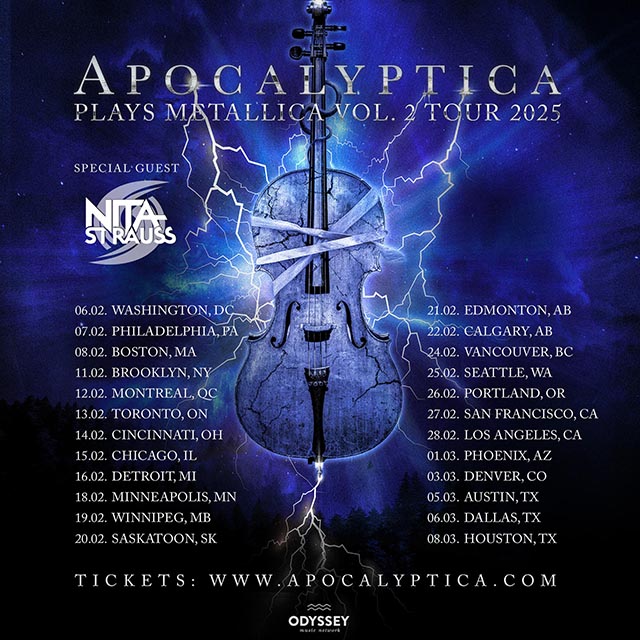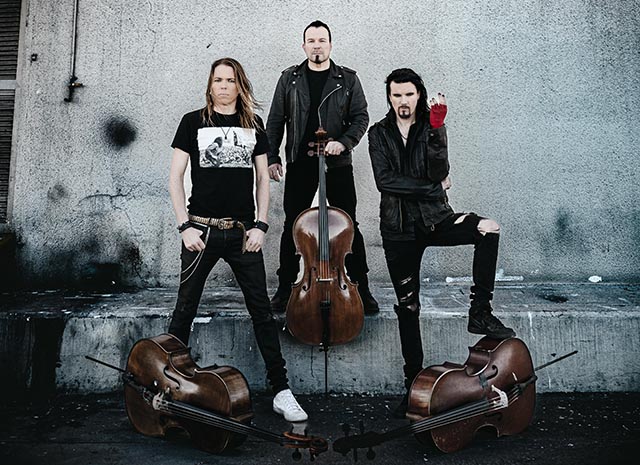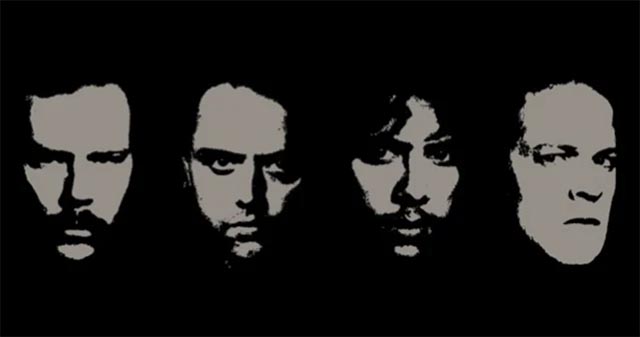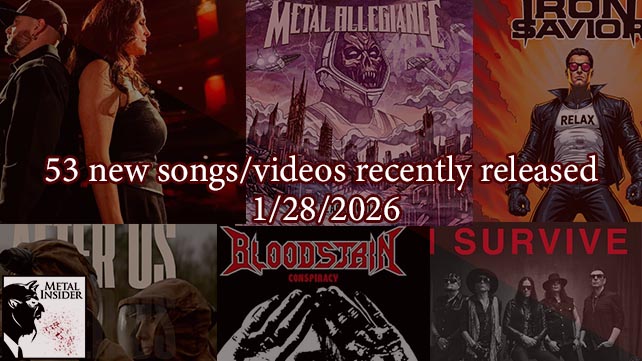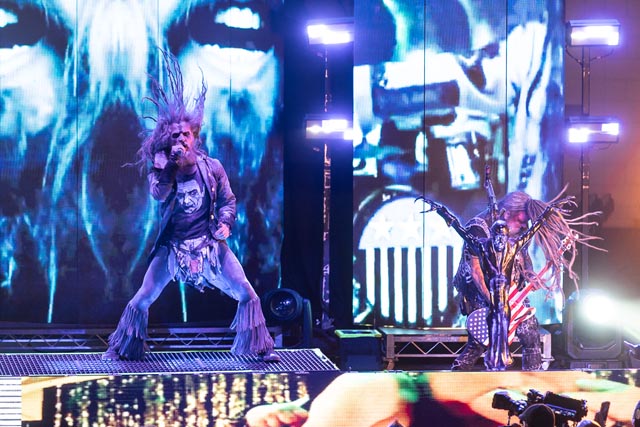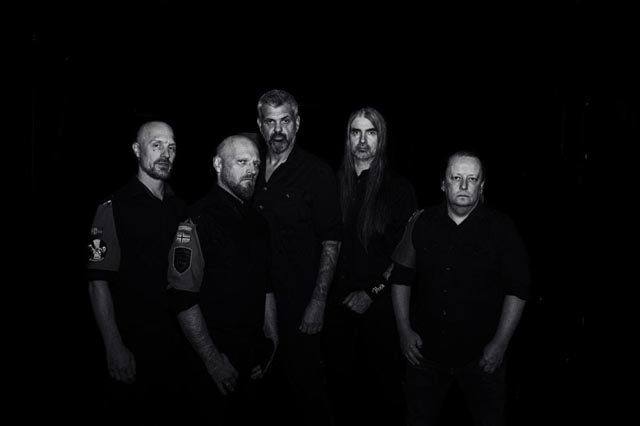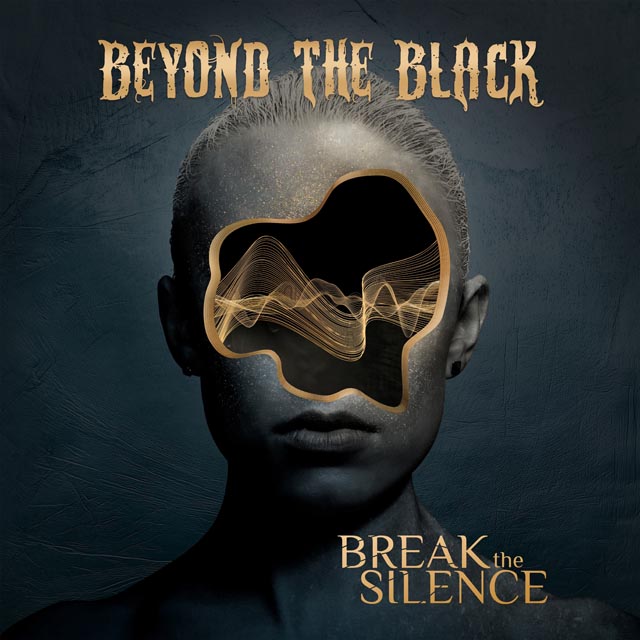A quick Google search will bring you countless bands and artists covering Metallica songs. Metallica encouraged artists to cover their music with the second Marching Band competition and the release of The Metallica Blacklist, where artists re-envisioned songs from the infamous 1991 Black Album. However, one artist has stood out for nearly thirty years, truly reinventing the wheel and sparking an impressive wave of creativity: Apocalyptica. This group of talented Finnish cellists came together in the early nineties to put their own spin on classic metal tunes, resulting in 1996’s Plays Metallica by Four Cellos. Holding nothing back, Apocalyptica soon blossomed into more than just covering metal songs, later showcasing their take on artists such as Sepultura and Slayer and creating original tracks.
Ultimately, these cellists are unique because they go beyond covering songs; each cover enhances the original and pairs well with it, giving fans a unique and unforgettable interpretation. Apocalyptica’s debut album remains an untouchable classic and a true tribute to the biggest and best metal band ever, Metallica.
Here we are, nearly thirty years later, and Apocalyptica surprised their fanbase with Plays Metallica Vol. 2. While you can hear a difference in production quality and change from the group, these renditions will have you listening to the record on repeat regardless of which Metallica-era track. The renditions of songs such as “Ride The Lightning,” “Unforgiven II,” “St. Anger,” and “The Call of Ktulu” all give an enigmatic haunting spin, shaping up to be arguably original recreations from Metallica’s catalog. With so much time between each volume and seeing these cellists grow over the last thirty years, Metal Insider had the opportunity to speak with Eicca Toppinen to discuss the new album, their experience, and all things Metallica-related.
What made you go back to the beginning to create volume two nearly 30 years later?
You know, we’ve always talked about someday we will do the second Plays Metallica album. It’s always been in the air, but It’s hard to tell why it felt like the right timing now. One reason is that when we did the Plays Metallica anniversary tour 2018 and 19 we played this massive tour with just Metallica music . It was actually super fun and more exciting than we thought it would be. And we could kind of revisit the old stuff using the experience we have gathered. And that led us to do a fully instrumental album with original music. And I think those were the steps to come to the point that actually would be exciting to see what we can do with Metallica’s music now. And maybe we were ready to give ourselves enough freedom to treat the music. I think Apocalyptica’s sound is so established for us in general. So there were many reasons. For some reason, it just started to kind of excite us.
Yeah, and even in the beginning, what got you into Metallica and inspired you to choose them for your defining release?
We all are classical cello players, classically trained, and huge metal fans, and especially Metallica fans since we were like 13, 12 years old. And we started to play Metallica just for our own fun in the beginning. So there was no plan to make any album or form a band, per say. It was more like we just gathered together a bunch of cellists who loved metal and played metal. So Metallica was the number one favorite and probably at that time felt Metallica being so melodic they had a lot of music that that kind of felt that, OK, it works out with the cello group version as well. The simple answer to the question is actually our love for Metallica’s music. That’s why we picked Metallica.
You make a great point, that their music lent to classical interpretation.
Yeah we played some Sepultura in 1993. But for the first album, it was limited to Metallica songs. So Metallica was not the only metal we played at that time when the first album came out. But It worked out the best because they have so many melodic and harmonic elements in their songs. The compositions are more rich in a way than a lot of metal music. A lot of metal music of that time is very much based on full blast energy. And it’s harder to make an exciting version with string instruments, I would guess. Of course, we learned that later. We learned that later on how to do it. We recorded Refuse, Resist. and we’ve done Slayer and stuff. But Metallica kind of was closest to the heart and also the variety of Metallica songs and the styles they have in their songs. It’s just unbeatable.
How did you come together with James Hetfield to do the narration in one? Like, whose idea was it? How did it happen?
Perttu had this vision for the arrangement. He wanted to have this grandiose, massive interpretation of the original, which is already really massive. But, you know, having an orchestra and his cinematic approach to it. And he had this vision that he wanted the lyrics to be narrated. So it’s like a narrator of a movie kind of thing. And we were talking about different actors who we should reach out to. And of course, somebody said, the ultimate would be James Hetfield. And then I was thinking, let me figure it out, I will speak with him. I will find a way to introduce the idea to him and let’s see what he says. And James got super excited about the idea.
I think because it’s so different, you know, the approach is different. And it also gave him a new kind of challenge, you know, how to speak the lyrics, which he has been performing a million times. And the spoken word gives a different dimension to the whole story – the lyrics come across in a little bit different way. And then, of course, you know, we became good friends with Metallica over the years. We’ve been doing a lot of things since 96, when we met for the first time when we were opening for them in Helsinki for two nights. So I had easy access to actually present all these ideas, like getting Rob to play bass and also even to get the original bass track by Cliff Burton for Call of Cthulhu.
Which track was the most challenging to interpret and record for volume two?
That’s hard to tell because we worked on many, many songs. At least 20 songs were on the table. And it was surprisingly challenging to pick the songs because it was all about making the Apocalyptica version great. Is our version bringing something new to the table? So it isn’t just a simple playing of Metallica songs with cellos, we’ve done that. It’s an all new kind of thing. So our approach was that, okay, we need to kind of feel the songs and that is the way that they turn out to be our songs. And we need to find the soul or the spirit of the original song, and we are able to play it and present it in a new way. And I think every arrangement was challenging in that sense.
To find out the balance, how to make the version different, how the version will be different enough from the original, so it makes sense. Without intentionally just trying to change things. You know, like changing things just to change things, that’s not interesting. So I think that’s why making these versions was a lot of searching and trying and figuring out what’s the kind of magic to us in every particular song.
It must have taken you, does it take you a really long time to do new arrangements?
Yeah, at least for me personally, and Perttu, we did the arrangements mainly. And for me, I kind of, I’m a little bit slow in that sense, because I want to understand deeply. I want to deeply feel what’s happening. And therefore, in the beginning, when we started to do the arrangement, I struggled a lot on getting something done that really excited me. So for me, it’s always about, I need to get super excited about what I do, like those ideas. And then it kind of starts to carry itself. So I tried many songs and I was like, I’m not really getting into the point where it’s not really cracking open. So that’s why I think somebody would think that making a cover album is easy, but the way we do it, this album was not at all easier than any other album we’ve done.
Well, it’s because you want to pay tribute to it, I’m sure.
Yeah, for us it also needs to make sense. We think that whatever we do, it needs to make sense. At least for us, we need to feel that, okay, yeah, this is actually great. This is cool. This makes sense. Okay, this is we have something new is happening, something exciting is happening here. So we need to have that feeling. Otherwise, it doesn’t make it worth doing. So we always want to push and of course, the starting point was like, okay, How are we doing now the new Metallica album? We kind of have to reinvent the wheel in a certain way. We can’t beat the first album in a certain way, but it needs to be equally revolutionary in a way in our world, you know, like kind of like whatever we do with Metallica, if we do a second Metallica album, it needs to blow away the listener. Yeah.
Yeah. And I guess like playing the cello, your whole body is in it. So I imagine it has to be exciting for you to be able to do that part of work, right?
Yeah, it is. It is super hard, especially when I have the mentality that I want to kind of play every note. Every note is important to me. Especially with my fucked up hand. We played this show on Saturday and kind of my left arm got into massive cramps.
How did you incorporate the Cliff Burton bass line in the recording process? Did you get that track and then work around it?
Yeah, I had kind of an idea for the arrangement, but then when we got the track we were thinking our version is a little bit different on the structure. We had to tune it and kind of pace it to our tempo and stuff and then we were like, okay, let’s make our arrangement super small. So we give the space to the bass. Like Cliff used to say that he’s the solo bass player of Metallica. So it affected a lot how we, in the final end, did the song. We wanted to give space for the cool, special things that Cliff is doing on the track. It was kind of unbelievable that we were able to get it. We got all the permissions and everybody involved got excited about the idea and it’s such an honor… almost like a holy experience to kind of play along with Cliff’s track.
In selecting St. Anger, you’re aware of the hostility that the fans had against the album. What made you delve into those tracks from that album?
For me personally, I don’t hate the album because I think it’s a cool album. The sound is very distinctive. But I have seen Metallica many times. We played with them when Saint Anger came out. And I heard Saint Anger and Frantic especially many, many times live. And I always thought that they’re great songs. And I didn’t really understand why people hated the album so much and thought that people didn’t really dive into the record. And I just knew somehow that something from that album would turn out great for us.
And I was listening last summer when we were already recording in LA, and I was still in the process of kind of working on the last arrangements. And I really listened a lot to the St.Anger album. And once I got beyond the sound, it kind of started to reveal to me a totally new layer of greatness, that it’s such a powerful record. For the people who despise it and are so opinionated about it, It’s such a great song and it has so much power and energy in it. And that’s why I wanted to have it on the album. I knew that it’s going to turn out to be something extraordinary.
Yeah, like eye opening for people, maybe giving the material another chance with fans.
Yeah it’s kind of like we people we tend to be so judgmental and we get our opinions up so quickly already. In those times even there was no social media but people get offended about things so fast so they don’t actually give time for things that are different than they expect. They don’t sink in and open up so they’d rather just do the judgment and throw it away, which is a pity because a lot of good stuff won’t be experienced because of too rushed reactions.
What is your personal favorite Metallica album and or song?
I would say my personal favorite album is Ride the Lightning. I don’t know why, but there’s something in the soundscape and the color of the sound of the record that always spoke to me a lot. But I think that for me, the mysterious sound of it, been always very, very exciting to me. But I love pretty much all the Metallica albums, so I’m not categorizing them so much like that. Sometimes I think And Justice for All is the best album, but most often I choose Ride the Lightning. And for the song, it’s impossible. In general, for music, for me, it’s like whatever feeds my mood. Whatever feeds my mood, that’s my favorite music at that very moment. And Metallica has an endless amount of great songs.
So now, are there songs that you did that didn’t make it onto volume two that might see a volume three?
That’s a good question. I would say at the moment, never say never, but at the moment it feels that Volume 3 won’t come right away. I think there are still great, great songs, but then there are a lot of metal songs that our approach probably should be different than on this album to make them work. Yeah, there’s still a lot of great music that is left out. We have recorded quite a few of Metallica songs, but there are still great songs. But I think like with this sound, what we have today, which is closer to, I would say, a regular band, that kind of approach to more Metallica songs, I don’t find that exciting, but if we kind of find out a totally, like a full acoustic, when we are retiring, maybe we will make this full acoustic volume three, and then we’ll play whatever kind of like really simplified cello versions of more Metallica. So that might happen, but nobody knows when.
And last but not least. So you’re touring with Nita Strauss coming up next year. And do you think you’ll do more dates with Metallica?
Yes. I’m pretty sure about it, that there will be another run later next year, maybe in the fall. Because we don’t like long tours. We try to keep them for a maximum of five weeks, rather four, at the time. So we can’t cover all the territories we want to go to in North America with one run. Usually there are at least two runs per album cycle. There haven’t been any discussions about doing more with Metallica at the moment. We’ve been doing so much now, so I think that’s not in their interest either. Plus, you know, us opening for Metallica with Metallica set doesn’t make any sense. Yeah, that’s true. So I think at least with this album cycle, I don’t see us playing together with Metallica. At least not opening for them.
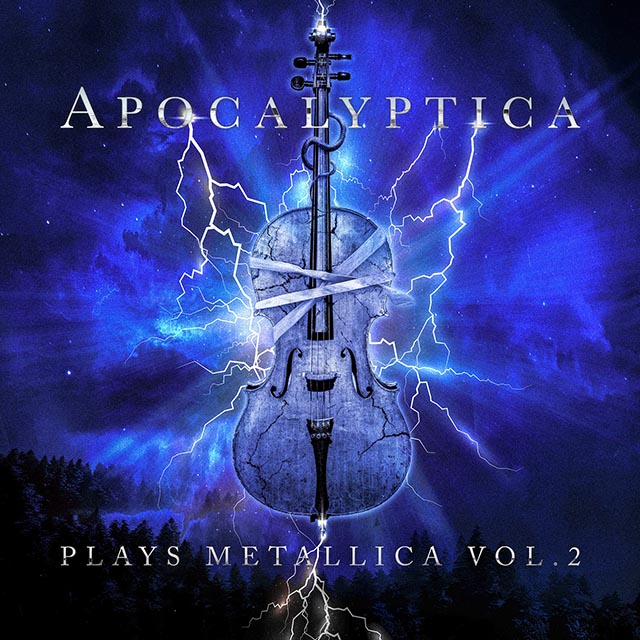
2025 Tour Dates w/ Nita Strauss:
02/06 Washington, DC @ Warner Theatre
02/07 Philadelphia, PA @ The Fillmore Philadelphia
02/08 Boston, MA @ Orpheum Theatre
02/11 New York, NY @ Brooklyn Paramount
02/12 Montreal, QC @ MTELUS
02/13 Toronto, ON @ Queen Elizabeth Theatre
02/14 Cincinnati, OH @ The Andrew J Brady Music Center
02/15 Chicago, IL @ Athenaeum Center
02/16 Detroit, MI @ The Fillmore Detroit
02/18 Minneapolis, MN @ Uptown Theater
02/19 Winnipeg, MB @ Burton Cummings Theatre
02/20 Saskatoon, SK @ Coors Event Centre
02/21 Edmonton, AB @ Midway Music Hall
02/22 Calgary, AB @ Grey Eagle Event Centre
02/24 Vancouver, BC @ Queen Elizabeth Theatre
02/25 Seattle, WA @ Moore Theatre
02/26 Portland, OR @ Crystal Ballroom
02/27 San Francisco, CA @ Palace of Fine Arts
02/28 Los Angeles, CA @ The Orpheum Theatre
03/01 Phoenix, AZ @ The Van Buren
03/03 Denver, CO @ Paramount Theatre
03/05 Austin, TX @ ACL Live – Moody Theater
03/06 Dallas, TX @ The Majestic Theatre
03/08 Houston, TX @ Bayou Music Center
